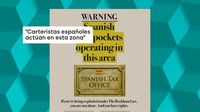The British law firm Amsterdam & Partners LLP has raised serious allegations against the Spanish Tax Agency (AEAT) in a report titled "Hacienda contra el pueblo: España y la Ley Beckham." The report, authored by Robert Amsterdam and tax expert Christopher Wales, reveals what they describe as a culture of intimidation and abuse within the AEAT, particularly targeting foreign taxpayers wishing to benefit from the Beckham Law.
On April 9, 2025, the AEAT approved a €125 million incentive program for its staff, which the report claims incentivizes inspectors to aggressively pursue additional tax revenues. This has led to claims that inspectors are fabricating cases against taxpayers, creating a climate of fear among both foreign expatriates and Spanish citizens alike.
"The AEAT unexpectedly targets taxpayers who have ended their stay in Spain, subjecting them to vindictive investigations," the report states, highlighting the agency's alleged tactics of demanding complex historical information with only ten days' notice and failing to respect legal deadlines. The report also accuses the AEAT of conducting what they term "fishing expeditions" in search of foreign assets that are supposedly exempt under the Beckham Law.
The Beckham Law, officially known as the Special Tax Regime for Displaced Workers, was introduced in 2005 to attract highly qualified international talent to Spain. It allows foreign workers to pay taxes only on their Spanish income at a fixed rate of 24% up to €600,000, exempting them from taxes on their worldwide income. However, the law has faced criticism for its implementation and for excluding certain groups, including professional athletes.
Amsterdam and Wales argue that the AEAT's practices undermine the rule of law, stating, "Our work has led us to believe that the way the AEAT operates, as demonstrated by its treatment of expatriates, undermines the rule of law. This should be a concern for citizens of Spain and for other EU member states and the European Commission." They assert that these systematic violations are incompatible with the values upheld by the European Union.
The report presents a dire warning about the potential economic ramifications of the AEAT's actions, suggesting that such practices could damage Spain's reputation abroad and deter foreign investment. "Investors will now look elsewhere. They will invest in other countries and send their best employees to other places. The Spanish economy will be affected and will continue to underperform compared to its neighbors," the report predicts.
In response to these allegations, the AEAT has defended its record, stating that only 0.5% of the 37,000 taxpayers who have opted for the Beckham Law have been inspected in the last decade. The agency claims that most inspections have resulted in agreements or compliance, and that they do not receive commissions based on the outcomes of individual cases.
However, Amsterdam's firm remains skeptical of these figures, calling for transparency and accountability from the AEAT. They argue that the pressure to generate additional tax revenue has led to abusive practices and that many expatriates have faced unexpected tax demands and substantial penalties.
The AEAT has also been accused of using intimidation tactics, including threats of criminal prosecution and damaging the reputations of taxpayers by suggesting they are tax evaders. These practices have prompted Amsterdam & Partners to consider legal action against the AEAT in various jurisdictions, including the European Court of Justice and the European Court of Human Rights.
During a press conference, Robert Amsterdam described the AEAT as a "disgrace for Spain," asserting that the agency's actions create an environment of fear and insecurity. He emphasized that their fight is not just about the Beckham Law but for the dignity of all taxpayers in Spain. "It’s time to say enough to the AEAT," he declared.
Wales, who has experience in British tax policy, echoed these sentiments, stating that the AEAT's current practices are "incompatible with a full European democracy." He criticized the AEAT's approach to the Beckham Law and called for reforms to ensure legal certainty for expatriates.
The report also highlights the AEAT's alleged financial incentives for inspectors, which reportedly amount to €1.2 billion, encouraging them to find more tax evaders. This has raised concerns about the independence of tax inspectors and the integrity of the auditing process.
In light of these accusations, Amsterdam & Partners has launched an international media campaign, publishing full-page ads in major publications such as the Financial Times and Wall Street Journal. They depict the AEAT as "Spanish pickpockets" and assert that the agency's practices constitute a systematic assault on the rights of expatriates.
Despite the AEAT's assurances that inspections are rare and justified, the law firm argues that the agency's actions have created a pervasive atmosphere of fear among taxpayers. They contend that many individuals have had their lives turned upside down by retrospective investigations that occur years after they have complied with tax regulations.
As this controversy unfolds, the implications for Spain's reputation as a welcoming destination for international talent are significant. The AEAT's aggressive tactics could deter future expatriates, undermining the very purpose of the Beckham Law, which was designed to attract skilled workers to boost the economy.
Ultimately, the ongoing legal battles and public scrutiny of the AEAT's practices may lead to necessary reforms in how tax laws are applied in Spain, particularly regarding the treatment of expatriates. The situation remains fluid, and the outcome of these actions will likely shape the future landscape of Spain's tax regime.






